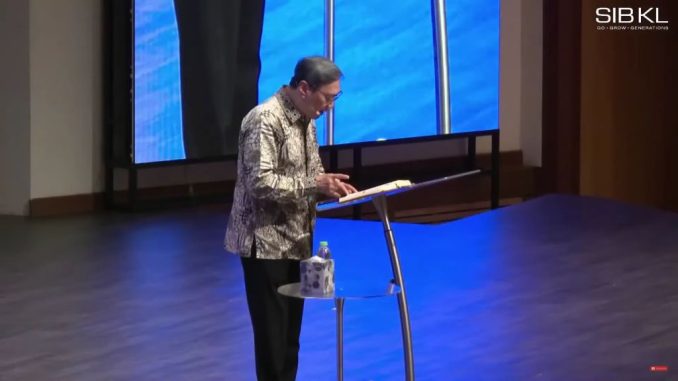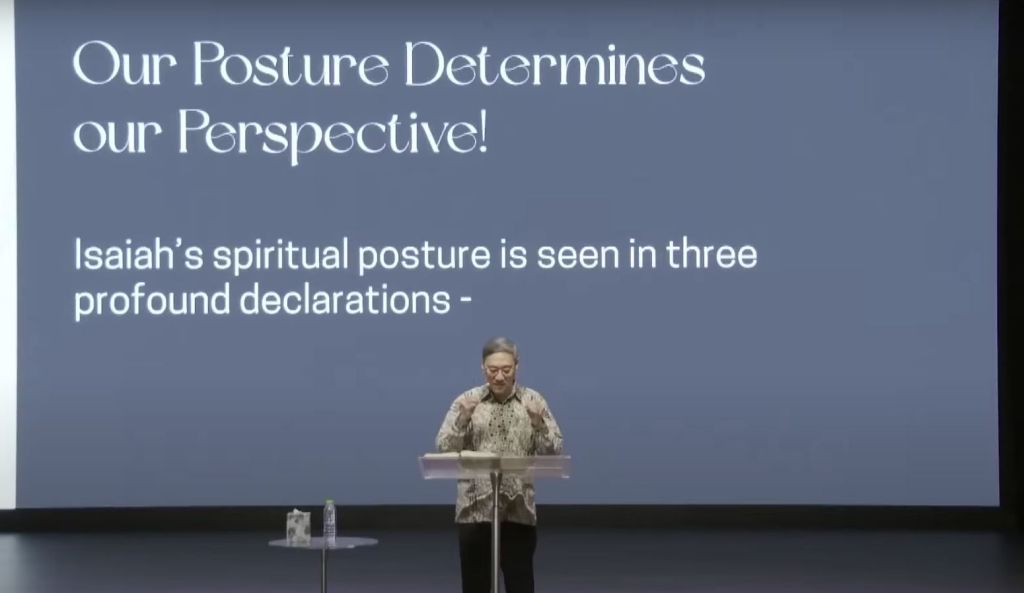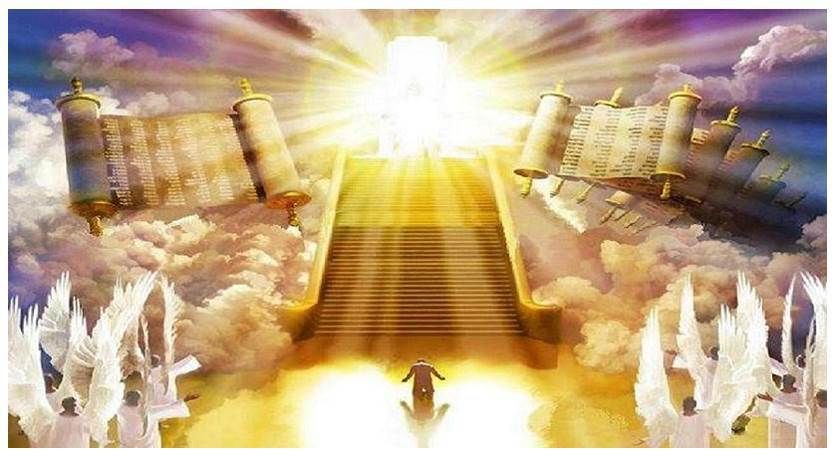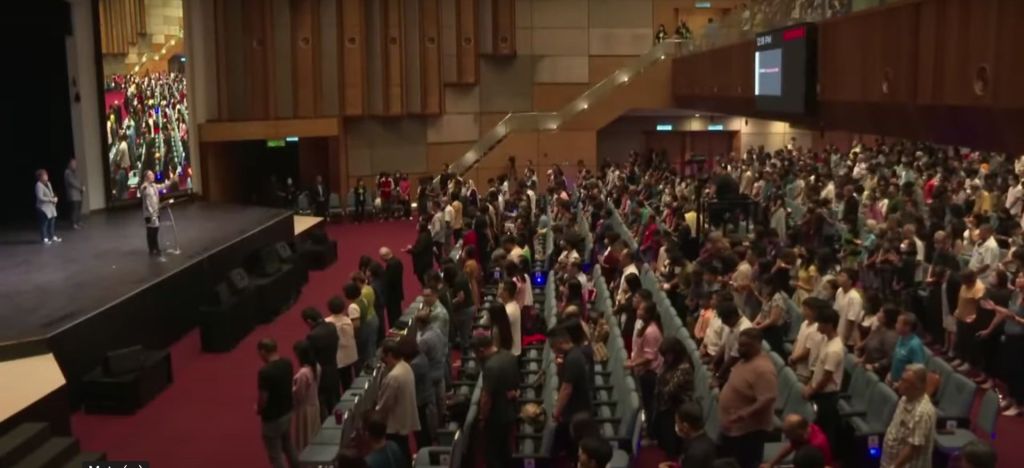
Life is often not plain sailing. As we navigate through it, we often cross uncharted waters full of uncertainties and sometimes even pain and sorrow. In an uncertain post-pandemic world, this is even more so. The pandemic has shown us some situations can take us unaware and which we are often unprepared for.
In a recent sermon by Rev Edmund Chan at SIB KL, he shared some life perspectives, basing them on the lessons from the prophet Isaiah. The essence of it is that our postures can often determine our outlook and how we look at things. Many Christians have experienced coming to a place of needing to kneel before the Lord to ask for His direction. In Isaiah 6, we can see the prophet Isaiah’s spiritual posture through three profound declarations. Each of these declarations has a connective point that will transform our worldview and draw us to a deeper relationship with God and our identity as His people.

The first of these three declarations can be found in Isaiah 6:1-4: “I saw the Lord“. This declaration is related to the correct alignment with God’s purpose. Rev Edmund highlighted three things from this declaration. The first is connected to understanding what Isaiah was facing, the second to what he saw, and the third to what he reported.
Isaiah 6:1-4
In the year that King Uzziah died, I saw the Lord, high and exalted, seated on a throne; and the train of his robe filled the temple. 2 Above him were seraphim, each with six wings: With two wings they covered their faces, with two they covered their feet, and with two they were flying. 3 And they were calling to one another:
“Holy, holy, holy is the Lord Almighty;
the whole earth is full of his glory.”
4 At the sound of their voices the doorposts and thresholds shook and the temple was filled with smoke.
What Isaiah faced was nothing short of a national crisis. His king was dead. King Uzziah had come to the throne at the age of 16, ruled for 52 years, and ushered in a golden age – an age of prosperity for the nation. And now he was gone, and it felt like an era had come and gone with him. And while the people were mourning, an enemy nation, Assyria, was rising up and flexing its military muscles westwards – towards Judah.

Rev Edmund pointed out that what Isaiah saw was vital. ‘Notice what Isaiah said he saw at this crucial time: he did not say he saw hope, strategy, or a plan. Isaiah said he saw the Lord.’ Judah’s king, Uzziah, was gone, but God was still present and alive on His throne. Uzziah’s time was over, God reigns forever. Uzziah was the nation’s prop, but God is the power. Isaiah was aligning himself rightly to God’s compass. Having seen the Lord, the attribute that struck Isaiah was God’s lofty and exalted position and holiness.
The holiness of God is His chief attribute. In the context of the original language, it meant to be set apart. It speaks not just about God’s greatness or goodness but also His transcendence. And furthermore, the language used by Isaiah emphasizes the superlative: holy, holy, holy. This attribute affirms and defines God’s absolute, complete, and total distinctiveness; there is none like Him.
Isaiah 46: 9-10
Remember the former things, those of long ago; I am God, and there is no other; I am God, and there is none like me. I make known the end from the beginning, from ancient times, what is still to come. I say, ‘My purpose will stand, and I will do all that I please.’
Rev Edmund conveyed that God’s holiness and transcendence have immense implications for the Church. Jesus told His disciples and us that we are God’s holy people, that is, a people set apart to be His light and salt on the Earth. It is our calling and identity as a Redeemed people.
In this fallen and broken world, there will be tears and difficulties. The rain falls on all of us, whether we are Christ’s followers or not, but God uses the circumstances and challenges in our life to refine and sanctify us so that we may become living testimonies. If we believe in an Almighty, transcendent God – a big God, the problems we face pale in comparison. Big God, small problems. Small god, big problems. Shifting our focus right will help us to move from our circumstances, challenges, and difficulties to one of anchor and alignment with the Lord. God has given us the authority to be His people. To be set apart and distinct. Just as God is distinctive, so are His people called to be.

The second of Isaiah’s declaration can be found in Isaiah 6:5: “Woe to me“.
Isaiah 6:5-7
5 “Woe to me!” I cried. “I am ruined! For I am a man of unclean lips, and I live among a people of unclean lips, and my eyes have seen the King, the Lord Almighty.”
6 Then one of the seraphim flew to me with a live coal in his hand, which he had taken with tongs from the altar. 7 With it he touched my mouth and said, “See, this has touched your lips; your guilt is taken away and your sin atoned for.”
While the first declaration was about alignment with God’s compass, this declaration was about relating aright with God’s conviction. When he saw the grand vision of the grandeur and holiness of God, it was not a feeling of smallness in front of a gigantic God that caused Isaiah to lament, but the conviction of his sinfulness in the face of a holy God. That sense of conviction was total. Because God is absolute, He does not see sin on a gradient scale; sin is sin. Rev Edmund shared a profound statement from Susanna Wesley, mother of John Wesley; “whatever increases the authority and power of the flesh over the spirit, that is sin.“
But the amazing thing is that from this conviction, came another – a conviction of forgiveness and cleansing. Isaiah saw a throne and an altar. God is seated on His throne, always sovereign and in control. But there was also an altar, an emblem of redemption and cleansing, restoration, and forgiveness. Isaiah encountered a powerful moment with God’s forgiveness and cleansing (v6-7).

Today, Jesus Christ is our altar of forgiveness. There is no other name by which man can be saved but purely through the blood of Christ (Acts 4:12), for all have sinned and fallen short of the glory of God (Romans 3:23), and the wages of sin is death but the gift of God is eternal life in Christ Jesus our Lord and Saviour (Romans 6:23). Jesus, the Lamb of God, forgives all our sins completely. Through His sacrifice, we have eternal salvation, freely given to us, and entirely through God’s grace.
We see a powerful example of this in the thief that was at Jesus’s side at Calvary. All the thief did was ask for forgiveness from a contrite heart, and Jesus promised him that he would be with Christ in Heaven. That is the power of the gospel.
So the question is, if salvation is free, why are there people who reject it and are unsaved? Rev Edmund shared that God does not send people to Hell. It is the pride and stubbornness of our own hearts. God sent His Son to save and redeem us, and all He asks is for us to believe. God honors the contrite heart, and the forgiveness of God is at the heart of the gospel. Not only that, God confers on us the status as His children. How can we look down upon this trivially? And yet, sadly many of us Christians today take this for granted, and many of us have become consumers. We need a fresh vision of God.
The third of Isaiah’s declaration is aligned with God’s calling (Isaiah 6:8).
Isaiah 6:8
8 Then I heard the voice of the Lord saying, “Whom shall I send? And who will go for us?”
And I said, “Here am I. Send me!”
Rev Edmund shared that in our reading of the Bible, we need to understand the context of the passages, which consists of both the theology and the tone. The theology of Isaiah 6 is about a holy God and the forgiveness of sin. The tone can be studied through the nature of God’s call and Isaiah’s response.

‘The call from God was not addressed to Isaiah directly but to the Heavenly Court. The call came from God. It was not a tone of boredom, ignorance, or anxiety. It was simply a question that demanded a response by its very nature; ‘who will go?’ The question was simply, “Whom should I send with this message of a God who is on the throne and the altar that cleanses? Whom should I send with this message of hope?’
And Isaiah didn’t need to look around. Imagine if you were Isaiah, having experienced and seen everything that he just did. Rev Edmund expressed that Isaiah’s response and tone would in high likelihood be that of gratitude. In the presence of God, there is fullness of joy, there is hope, there is fulfillment of life.
‘Don’t let our unbelief or stubbornness or our fears and insecurities hold us back,’ Rev Edmund encouraged. ‘Rather, let our sense of gratitude and joy and fulfillment in the fresh vision of God move us from our consumerism to a missional perspective. Let our declaration be “In an uncertain world, we have the power and the clarity of the Gospel because we saw God on the throne. Seek the things of God first and all these things will be added unto you. When we have a fresh vision of God, it changes our whole perspective on life.’

Note: This is an adaptation of a sermon shared by Rev Edmund Chan at SIB KL on the 30th of April 2023. Rev Edmund’s message is a deep, timely, and important one, and this article merely captures its gist due to the limitations of an online article. We believe that the sermon will impart something of significance into the hearts of receptive listeners. You may access the full sermon from SIB KL’s YouTube page at https://youtu.be/LBnv2bCjbiA
|Share The Good News|




Leave a Reply